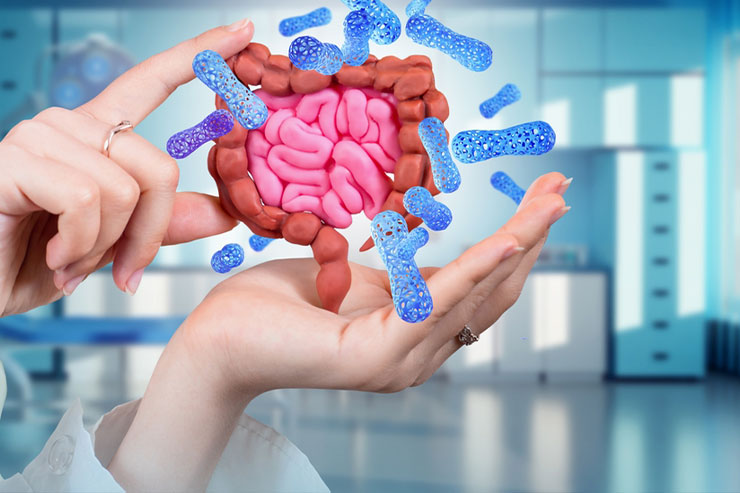What begins to develop the moment you are born and is as unique as your fingerprint? Answer: your gut microbiome.1
And what, exactly, is that? Good question.
Think of your gut microbiome almost like an organ.2 Located in your gastrointestinal tract—specifically, in your large intestine—it is made up of microorganisms, including fungi, viruses, and 500–1,000 different species of bacteria.3 These bacteria are mostly regarded as “good” or “beneficial” bacteria, and they help your body function well by:4,5,6
- Digesting and extracting nutrients from the food and drinks you consume.
- Strengthening your immune system by protecting it against harmful microbes that can cause disease.
- Regulating your metabolism.
- Synthesizing certain vitamins and amino acids.
- Supporting your mental health.
The relationship between the gut and the body is symbiotic because one relies on the other to thrive. Studies have shown a link between the following illnesses and an imbalance between healthy and unhealthy microbes in the gut:7,8,9,10
- Obesity
- Type 2 diabetes
- Heart disease
- Inflammatory bowel diseases
- Colon cancer
- Disorders of the central nervous system, including anxiety and depression
- Rheumatoid arthritis
Aside from eating a healthy diet, one of the best ways to ensure your gut microbiome is working as effectively as possible is to take a probiotic supplement like Culturelle® Digestive Daily.
Culturelle® Digestive Daily incorporates the strain Lactobacillus rhamnosus GG (LGG®), which is the most clinically studied probiotic strain and is strong enough to survive stomach acid, thereby ensuring the probiotic ends up in the intestines.
Caring for your gut should constitute an important part of your health routine. Ultimately, your body—and mind—will thank you for it.
Sources
1 https://pubmed.ncbi.nlm.nih.gov/28095889/
2 https://pubmed.ncbi.nlm.nih.gov/22647038/
3 www.ncbi.nlm.nih.gov/pmc/articles/PMC7043356/
4 https://pubmed.ncbi.nlm.nih.gov/27231050/
5 https://pubmed.ncbi.nlm.nih.gov/22968153/
6 www.ncbi.nlm.nih.gov/pmc/articles/PMC4425030/
7 www.ncbi.nlm.nih.gov/pmc/articles/PMC4202342/
8 https://pubmed.ncbi.nlm.nih.gov/26616538/
9 www.ncbi.nlm.nih.gov/pmc/articles/PMC4879184/
10 www.ncbi.nlm.nih.gov/pmc/articles/PMC4425030
